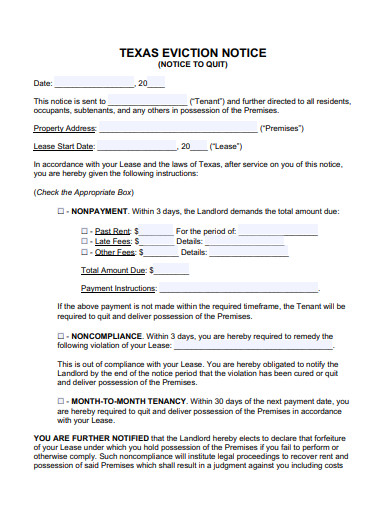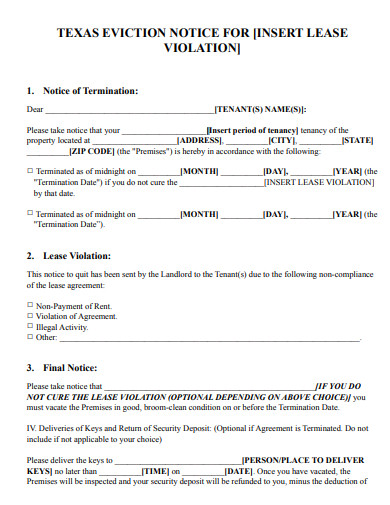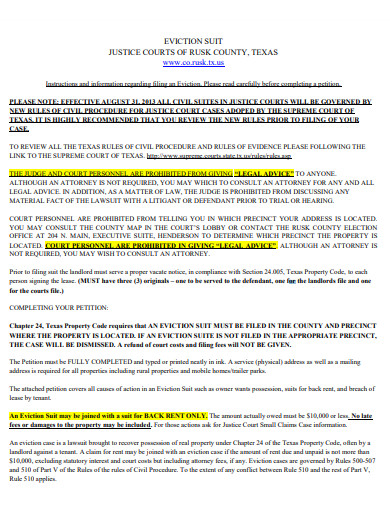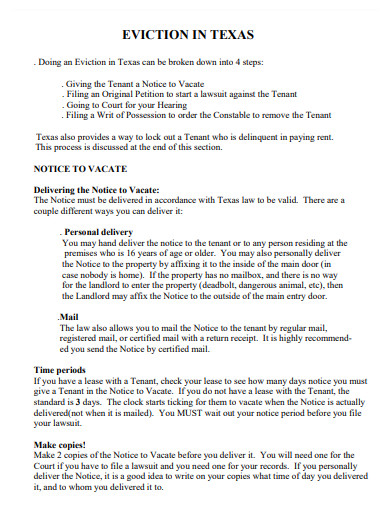An eviction notice is a written document served by a after the landlord and a tenant agreement, informing the tenant whether they have violated the long term rental agreement and must vacate the sample commercial property lease within a specified time period. The notice is used as the first step in the sample eviction notice process and serves as formal notification to the tenant that they are in breach of their lease agreement samples.
The eviction notice typically includes the date of the move out notice, the name and address of the tenant, the description of the property, the reason for the eviction, the date by which the tenant must vacate the property, and the signature of the landlord or authorized agent.
3+ Printable Texas Eviction Notice Samples
1. Texas Eviction Notice
2. Sample Texas Eviction Notice
3. Simple Texas Eviction Notice
4. Printable Texas Eviction Notice
What is Printable Texas Eviction Notice?
A Texas Eviction Notice is a written document served to a tenant by a landlord in the state of Texas, informing the tenant that they have violated the terms of their rental agreement samples and must vacate the property within a specified time period, usually 3 or 7 days. The notice is used as a first step in the eviction process.
How To Make a Printable Texas Eviction Notice?
The type of eviction notice used can vary depending on the circumstances and the laws of the jurisdiction in which the rental property is located. For example, in Texas, there are two types of eviction notices: 3-day and 7-day notices. It is important for landlords to understand the eviction process and to follow the appropriate policy and procedures, including serving a proper eviction notice, in order to avoid legal memo sample complications and ensure a successful eviction. Here are the detailed steps to create an eviction notice template:
Step 1- Gather Information
Before creating the eviction notice, gather the following information such as the name and address of the tenant, description of the property, and reason for the eviction.
Step 2- Choose the Type of Notice
In Texas, there are two types of eviction notices: 3-day and 7-day notices. Choose the type of notice that best fits the circumstances of the eviction.
Step 3- Write the Notice
Make sure to write the date of the notice at the top of the page. In the next line, include the name and address of the tenant. Then, include a description of the property, including the address. You can explain the reason for the eviction in clear, concise language. Don’t forget to include the date by which the tenant must vacate the property, calculated according to the type of notice being used. Lastly, sign the notice, including your name and title, if applicable.
Step 4- Deliver the Notice
The eviction notice must be delivered to the tenant in a manner that provides proof of delivery, such as hand delivery, certified mail, or posting on the property in a conspicuous place. It is important to keep a copy of the eviction notice for your records in case you need to provide proof in court.
Why would a landlord issue an eviction notice?
A landlord may issue an eviction notice for a variety of reasons, such as non-payment of rent, violation of lease terms, damage to the property, or illegal activity on the property.
What is the time frame for an eviction notice?
The time frame for an eviction notice depends on the laws of the jurisdiction in which the property is located. In Texas, for example, there are 3-day and 7-day notices.
How is an eviction notice served?
An eviction notice must be delivered to the tenant in a manner that provides proof of delivery, such as hand delivery, certified mail, or posting on the property in a conspicuous place.
In conclusion, the eviction notice serves as the first step in the eviction process and provides formal notification to the tenant that they are in breach of their lease agreement. It clearly states the reason for the eviction, such as non-payment of rent, violation of lease terms, damage to the property, or illegal activity on the property. Moreover, it specifies the time frame for the tenant to vacate the property, which is determined by the laws of the jurisdiction in which the property is located.
Related Posts
FREE 10+ Notice of Intent to Vacate Samples in PDF
FREE 10+ Notice to Proceed Samples in PDF
FREE 10+ Violation Notice Samples in PDF
FREE 10+ Price Increase Notice Samples in PDF
FREE 10+ Past Due Notice Samples in PDF
FREE 12+ Legal Notice Samples in MS Word | Pages | Google Docs | PDF
FREE 10+ Health Insurance Exchange Notice Samples in PDF | DOC
FREE 10+ Meeting Notice Samples & Templates in Google Docs | MS Word | Apple Pages
FREE 10+ Employee Return to Work Samples in PDF | DOC
FREE 10+ Notice of Return to Work Samples [ Leave, Ability, Intent ]
FREE 9+ Sample Notice Agreement Templates in PDF
FREE 10+ Retail Notice Samples in PDF | MS Word
FREE 12+ Contractor Notice Samples in PDF | MS Word | Excel
FREE Why Is Notice of Copyright Important? [ Importance, Purpose, Elements, Advantages ]
FREE 11+ Rent Notice Samples & Templates in PDF | Google Docs | MS Word | Apple Pages




